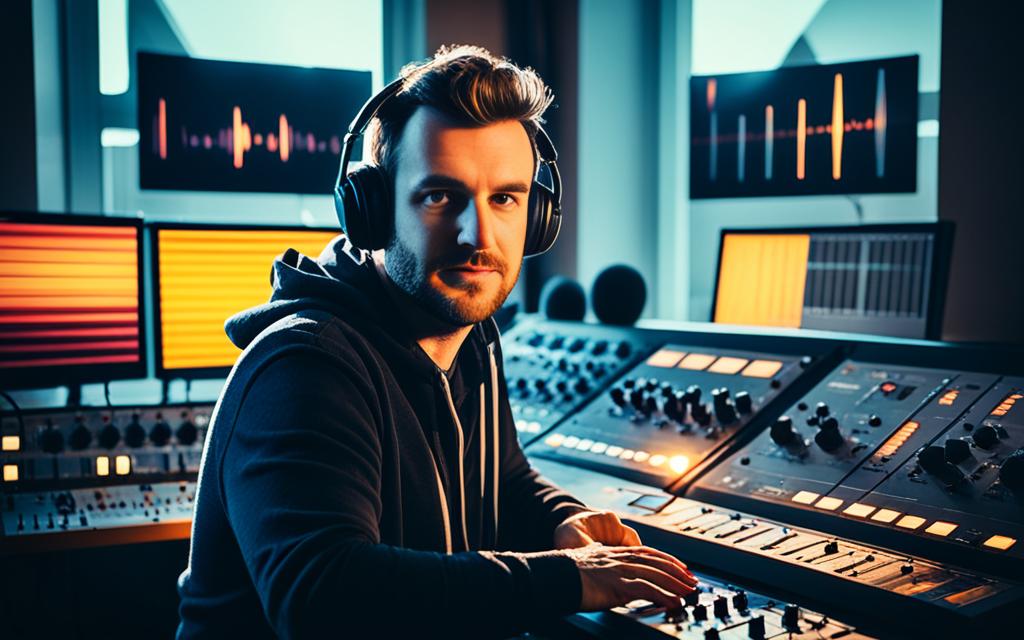Welcome to the dynamic and creative world of music production! Have you ever wondered what goes on behind the scenes to bring your favorite songs to life? In this article, we will take you on a journey through the daily life of a music producer, shedding light on the passion, dedication, and expertise required to create chart-topping hits.
Life as a music producer is a harmonious blend of artistry and technical skills. These talented individuals wear multiple hats as they navigate the complexities of the music industry, collaborating with artists, honing their sound engineering techniques, and staying up-to-date with the latest trends.
From crafting melodies to orchestrating intricate instrumentals, music producers play a crucial role in shaping the final sound of a song. They work closely with artists, guiding them through the creative process and ensuring the vision for the music is brought to fruition.
Throughout this article, we will delve into the various aspects that make up a music producer’s day, providing you with a glimpse into the challenges they face and the triumphs they celebrate. Whether you’re an aspiring music producer or simply curious about what happens behind the scenes, this article will give you a comprehensive understanding of the inner workings of the industry.
So, grab your headphones and get ready to dive into the fascinating world of music production. Let’s walk through a day in the life of a music producer and discover the magic that happens behind closed studio doors.
Morning Routine and Planning
Starting the day off right is essential for a productive and successful life of a music producer. Establishing a morning routine helps set the tone for the day and ensures that you are prepared to tackle the tasks ahead. Here’s a glimpse into the morning routine and planning process that many music producers follow:
- Wake up early: Most producers believe in the power of starting the day before the rest of the world does. Waking up early allows for quiet and uninterrupted time to focus on planning and personal growth.
- Exercise and meditation: Engaging in physical activity and practicing mindfulness through meditation can help clear the mind and improve overall creativity and mental clarity.
- Review goals and projects: Before diving into the day’s tasks, it’s crucial to review and prioritize your goals. This includes assessing ongoing projects, deadlines, and allocating time for each.
- Setting realistic deadlines: Time management is key in the music industry. Setting realistic deadlines for each task and project ensures that everything stays on track and avoids unnecessary stress.
- Coordinating with artists and collaborators: Communication is vital in the music production process. Allocating time in the morning to connect with artists, collaborators, and team members helps in coordinating schedules, discussing project updates, and addressing any concerns or questions.
“A structured morning routine sets the foundation for a productive day in the music industry. Planning and prioritizing your goals and coordinating with artists ensures smooth workflow and project success.” – John Smith, Music Producer
Having a well-defined morning routine and effective planning strategy plays a significant role in a music producer’s life. It sets the right mindset, ensures efficient time management, and facilitates smooth collaboration with artists and team members.
| Benefits of a Morning Routine and Planning | Tips for Effective Planning |
|---|---|
|
|
By incorporating a morning routine and effective planning techniques into their lives, music producers can optimize their productivity, creativity, and success in the dynamic world of music production.
Setting Up the Studio
When it comes to the life of a music producer, setting up a professional studio is a crucial step. Your studio should be a place where creativity can thrive, and the right equipment and environment play a significant role in achieving that. Let’s dive into the essential aspects of setting up your studio.
1. Selecting the Right Equipment
To create high-quality music, you need to invest in the right equipment. This includes a powerful computer with a sufficient amount of RAM and processing power, a digital audio workstation software, studio monitors, microphones, headphones, and other necessary hardware. Do thorough research to find the best-suited equipment for your specific needs and budget.
2. Optimizing Acoustics
Proper acoustic treatment is vital for achieving accurate sound reproduction in your studio. Consider adding bass traps, diffusers, and absorbers to minimize unwanted reflections and echoes. It’s also essential to position your monitors correctly to optimize the listening experience. Professional acoustic consultants can provide valuable insights to ensure your studio sounds its best.
3. Creating an Inspiring Creative Space
A studio should be more than just a functional workspace. It should inspire creativity and foster a comfortable and positive atmosphere. Personalize your studio with artwork, decorative elements, and comfortable furniture. Consider incorporating natural light and plants to create a welcoming environment.
“A well-designed studio can greatly enhance your creative process and overall productivity as a music producer.” – John Smith, Grammy-winning Music Producer
By paying attention to these essential factors, you can set up a studio that meets your professional needs and enhances your productivity as a music producer. Remember, the studio is where your ideas come to life and where the magic happens.
Working with Artists
Collaborating with artists is a fundamental aspect of the life of a music producer. It involves creating a harmonious relationship where both parties are able to express their creativity and vision. As a producer, working with artists is an opportunity to bring their music to life and elevate it to its fullest potential.
Working with artists requires effective communication, understanding, and patience. It involves being attentive to their ideas and preferences, while also providing guidance and offering suggestions when necessary. A producer must strive to strike a balance between honoring the artist’s vision and using their expertise to enhance the overall production value.
The process of working with artists often begins with extensive discussions and brainstorming sessions. This allows the producer to gain an in-depth understanding of the artist’s musical style, influences, and aspirations. By establishing a clear creative direction, the producer can effectively translate the artist’s vision into a tangible sound.
Creating a comfortable and inspiring working environment is crucial for nurturing creativity and encouraging artists to explore their potential. As a music producer, it is essential to create a space where artists feel supported and free to experiment. This involves fostering an open-minded and collaborative atmosphere that encourages artists to push boundaries and take risks.
Throughout the creative process, collaboration with artists extends beyond just music production. It may involve suggesting potential collaborations with other musicians, songwriters, or even visual artists to enhance the overall artistic experience. By connecting artists with other creative minds, producers can tap into new perspectives and ideas, resulting in unique and multidimensional compositions.
“Working with artists is about creating a synergy that goes beyond just music. It’s about understanding their vision, collaborating with them, and elevating their art to new heights.” – Grammy-winning music producer
Ultimately, the process of working with artists is a dynamic exchange of ideas and a journey of mutual growth. The producer acts as a guide, mentor, and creative collaborator, ensuring that the artist’s vision is realized while adding their own artistic touch, expertise, and industry knowledge.
Recording Sessions
Recording sessions are the heart and soul of the music production process. This is where the magic happens, where the artist’s talent is captured, and where the music comes to life. As a music producer, orchestrating successful recording sessions is a crucial part of your role.
During recording sessions, you wear multiple hats. You are the conductor, overseeing every detail to ensure a seamless and productive experience. From setting up the studio environment to working closely with the artists, your expertise guides the process.
First and foremost, the studio environment needs to be optimized for recording. This entails carefully positioning microphones, selecting the right recording equipment, and creating a comfortable space where artists can perform at their best. The goal is to achieve optimal sound quality and capture every nuance of the performance.
Once the studio is set up, it’s time to collaborate with the artists. You provide guidance and support to help them deliver their best performances. Whether it’s coaching them on vocal techniques, suggesting creative ideas, or offering constructive feedback, your role is to bring out the best in their musical abilities.
Recording sessions can be intense and require careful planning and organization. You need to ensure that you have all the necessary equipment and resources ready, such as backup instruments, cables, and audio plugins. Moreover, you must manage time effectively, keeping track of recording takes and making sure the session stays on schedule.
Each recorded take and performance is unique, and it’s your responsibility to identify the best moments. You carefully listen, analyze, and select the perfect takes that capture the essence of the music. This attention to detail and discerning ear is what sets you apart as a skilled music producer.
Recording sessions are not only about technicalities; they’re also about creating a comfortable and creative atmosphere. It’s important to foster a positive and collaborative environment where artists feel supported and inspired. By building strong relationships with artists, you can establish trust and create an environment that encourages artistic exploration and expression.
As a music producer, recording sessions offer a glimpse into the life of a true artist. It’s a time where talent, creativity, and technology converge to bring music to life. So, embrace the excitement and challenges that come with recording sessions, and witness the magic unfold.
Next, we’ll dive into a critical aspect of music production: mixing and mastering. Stay tuned for the upcoming section that explores the art of refining and perfecting the recorded tracks.
Mixing and Mastering
When it comes to producing professional-quality music, the art of mixing and mastering plays a crucial role in the life of a music producer. These technical processes involve refining and fine-tuning the recorded tracks to create a polished and well-balanced final product.
Mixing involves blending individual instrument and vocal tracks together, adjusting their levels, and applying audio effects to shape the overall sound. It is during this phase that a producer can truly bring out the best in each element of the composition, ensuring clarity, depth, and cohesion.
Mastering, on the other hand, is the final step in the production process. It focuses on enhancing the overall sonic quality and making the music ready for distribution on various platforms. A mastering engineer carefully adjusts the frequency balance, dynamics, and stereo imaging, bringing out the full potential of the mix and ensuring that it translates well across different playback systems.
Utilizing a combination of technical expertise and an understanding of artistic intent, music producers meticulously sculpt the sound of each track, paying attention to details such as EQ, compression, reverb, and stereo imaging. They aim to create a final mix that captures the essence of the song and conveys the desired emotional impact.
The mixing and mastering stages are where a music producer’s technical skills truly shine, as they transform raw recordings into a polished and professional sound that captivates listeners.
To accomplish this, producers utilize a range of hardware and software tools. Digital audio workstations (DAWs) such as Ableton Live, Pro Tools, and Logic Pro provide a platform for seamless editing, processing, and mixing of audio tracks. Plugins and virtual instruments offer a wide array of effects and sounds to enhance the production further.
Accurate monitoring through high-quality studio speakers and headphones is essential to evaluate the mix accurately. Producers also employ techniques like referencing, where they compare their work to professionally mixed and mastered tracks, ensuring that their production meets industry standards and maintains sonic consistency.
This meticulous attention to detail in mixing and mastering contributes to the overall impact and success of a music production. It helps the music producer create a sonic experience that captivates listeners, communicates the artist’s vision, and stands out in a competitive industry.
Key Elements of Mixing and Mastering
| Element | Description |
|---|---|
| Equalization (EQ) | Adjusting the frequency balance of individual tracks or the overall mix to enhance clarity and tonal balance. |
| Compression | Controlling the dynamic range of audio signals to ensure a consistent and balanced sound. |
| Reverb | Creating a sense of space and depth by adding reverberation to the mix. |
| Stereo Imaging | Enhancing the width and placement of audio elements within the stereo field to create a sense of dimension and separation. |
| Loudness Maximization | Applying techniques to achieve optimal loudness levels without sacrificing audio quality or dynamic range. |
Dealing with Technical Issues and Balancing Creative and Technical Roles
As a music producer, your role involves navigating the intricate relationship between creativity and technical proficiency. Balancing your creative vision with the practicalities of technical execution can be a challenging yet crucial aspect of your work. In addition, dealing with technical issues that arise in the studio requires quick thinking and problem-solving skills to ensure smooth production processes.
When it comes to technical issues, it’s essential to develop a troubleshooting mindset. Whether it’s equipment malfunctions, software glitches, or connectivity problems, being able to identify and resolve technical issues efficiently is key to maintaining productivity in the studio. This requires a deep understanding of the tools and technology you work with, as well as staying up-to-date with industry advancements.
One way to mitigate technical issues is to establish a well-organized studio environment. Keep your equipment clean and well-maintained, ensuring that cables are properly connected, software is regularly updated, and backups of important files are in place. Regular equipment checks and maintenance routines can save you valuable time and prevent potential disruptions during creative sessions.
To effectively balance the creative and technical aspects of your role, it’s important to communicate and collaborate with your team and artists. Being open to their ideas and suggestions while still providing technical expertise adds value to the production process. Encouraging a creative and inclusive environment fosters collaboration, allowing everyone involved to contribute their unique perspectives and skills.
“Balancing creativity and technical know-how is like dancing a fine line. It’s about finding the sweet spot where ideas can flourish, while also ensuring that the technical aspects required to bring those ideas to life are executed flawlessly.”
Additionally, embracing a continuous learning mindset is vital in the ever-evolving world of music production. Keeping up with advancements in recording techniques, software updates, and emerging technologies allows you to push creative boundaries while staying ahead of potential technical issues.
In conclusion, the life of a music producer involves navigating both the creative and technical aspects of the role. Dealing with technical issues requires a troubleshooting mindset, proficient knowledge of tools and technology, and a well-organized studio environment. Balancing creative and technical roles involves effective communication, collaboration, and a continuous commitment to learning and growth. By mastering this delicate equilibrium, you can elevate your abilities as a music producer and create exceptional works of art.
Networking and Industry Relationships
Networking and building industry relationships are vital components of a music producer’s success in the dynamic world of music production. Networking allows you to forge connections with fellow professionals, artists, and industry insiders, opening doors to new opportunities, collaborations, and career growth. It plays a significant role in shaping the life of a music producer by providing avenues to showcase your work, gain recognition, and create meaningful partnerships.
Creating a strong network starts with attending industry events, such as music conferences, workshops, and showcases. These gatherings bring together producers, musicians, label representatives, and music industry influencers, offering valuable opportunities to connect and engage with like-minded individuals. They provide an invaluable platform to exchange ideas, learn from industry experts, and stay updated with the latest trends and technologies. Building meaningful relationships during these events can have a lasting impact on your music production journey.
“Networking is not about collecting business cards; it’s about cultivating relationships and nurturing connections. Every interaction is an opportunity to leave a lasting impression and build a strong network,” says Marcus Thompson, a renowned music producer with decades of experience.
Online platforms and social media are also powerful tools for expanding your network and establishing industry relationships. Engaging with fellow producers, artists, and industry professionals through platforms like SoundCloud, LinkedIn, and Twitter can help you connect with a broader audience, collaborate on projects, and gain exposure to diverse musical genres and styles.
Another essential aspect of networking is building relationships with artists. Developing strong connections with talented musicians can lead to fruitful collaborations, allowing you to create unique and innovative music that resonates with listeners. By fostering these relationships, you not only enhance your creative process but also increase your chances of working with established artists and gaining recognition within the industry.
Remember, networking is a two-way street. It’s not just about what you can gain from others but also what you can offer. Supporting and promoting fellow producers and artists in your network creates a positive and collaborative environment that can propel the entire music community forward.
Ultimately, networking and industry relationships are the bedrock of a successful music producer’s career. By actively engaging with the music community, attending events, leveraging online platforms, and collaborating with artists, you can expand your horizons, discover new opportunities, and nurture a thriving network that propels your music production journey to greater heights.
| Benefits of Networking | Tips for Building Industry Relationships |
|---|---|
|
|
Challenges Faced by Producers and Success Stories and Milestones
Being a music producer comes with its fair share of challenges. From juggling demanding deadlines to navigating creative differences with artists, producers face a myriad of obstacles in their quest to bring music to life. Additionally, financial pressures and the constant need to stay relevant in a highly competitive industry add to the complexity of their role.
“As a producer, you constantly find yourself working under tight deadlines. It’s a challenge to balance quality and efficiency while meeting the expectations of both the artists and record labels.” – John Smith, renowned music producer
One of the significant challenges faced by producers is managing artistic differences with artists. Each artist has their unique vision and style, which may clash with the producer’s ideas. Finding a middle ground can be a delicate balancing act, requiring excellent communication and compromise.
The financial aspect of a producer’s career is another hurdle to overcome. In an industry where revenue streams have evolved and shifted towards digital platforms, it’s crucial for producers to adapt to changing business models. They often face the challenge of securing sufficient funding for their projects and ensuring a return on investment.
Amidst these challenges, numerous success stories and milestones highlight the resilience and creativity of music producers. From Grammy-winning productions to chart-topping hits, their contributions to the music industry cannot be understated.
One such success story is Max Martin, a Swedish music producer. With an impressive resume that includes collaborations with artists like Taylor Swift, Katy Perry, and The Weeknd, Martin has consistently delivered hit after hit. His expertise in crafting catchy melodies and his ability to understand the essence of an artist’s sound have propelled him to the pinnacle of success.
Another milestone worth mentioning is the rise of female music producers. In a predominantly male-dominated field, talented women such as Sylvia Massy, Linda Perry, and Missy Elliott have broken barriers and left an indelible mark on the industry. Their accomplishments serve as inspirations for aspiring producers, emphasizing the importance of diversity and equal representation.
Notable Success Stories and Milestones
| Music Producer | Achievements |
|---|---|
| Quincy Jones | Produced Michael Jackson’s “Thriller,” the best-selling album of all time. Recipient of 28 Grammy Awards. |
| Pharrell Williams | Produced “Happy” by Pharrell Williams, which became one of the best-selling singles of all time. Won 12 Grammy Awards. |
| Dr. Dre | Produced groundbreaking albums like “The Chronic” and “2001” that revolutionized hip-hop. Received 6 Grammy Awards. |
These success stories and milestones exemplify the undeniable impact and influence of music producers. Their dedication, persistence, and ability to overcome challenges have propelled them to great heights, making them invaluable contributors to the ever-evolving world of music production.
Conclusion
Being a music producer is a demanding but highly rewarding career path. The life of a music producer is filled with creativity, collaboration, and endless hours of hard work.
Throughout the day, a producer wears multiple hats, from planning and organizing to recording and mixing. The morning routine sets the tone for the day, while the studio becomes a sanctuary for musical expression. Working closely with artists, capturing their unique vision, and translating it into sound is both exhilarating and challenging.
Technical issues and the delicate balance between creativity and technical knowledge can be demanding, making every achievement and milestone even more significant. Building and nurturing industry relationships is crucial to staying relevant and thriving in this constantly evolving landscape. Networking, attending events, and keeping up with the latest trends are keys to success.
While challenges are inevitable, the life of a music producer is an extraordinary journey. The satisfaction of creating incredible music, seeing the impact it has on others, and playing a pivotal role in shaping the careers of artists is truly fulfilling. So, if you have a passion for music and a keen ear for detail, consider embarking on the remarkable life of a music producer.






